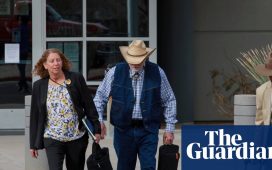AVON, Colorado — The Aspens Mobile Home Village sits on a wedge of land tucked between eastbound I-70 and the Eagle River in the mountains near Vail. The park is easy to miss in the blur of freeway speeds — trees, a fence, trailers flashing past before the blue sign for Exit 167 zooms into view, advertising Burger King and Subway and Fiesta Jalisco.
The Aspens is unobtrusive, the way people who don’t live in mobile homes parks tend to prefer them, and in this it sets itself apart from the county’s largest park about 10 minutes down the road in Edwards. That park, Eagle River Village, has been in the news for its persistent, still unresolved poor water quality. Its row after row of weary, faded trailers rise from the river up the hillside toward the million-dollar plus homes and golf courses of Cordillera.
The two parks are among 31 in Eagle County. These communities vary in size from tiny to sprawling — the county counts a total of 1,248 mobile homes — but nearly all are filled with people who work in the hospitality, service and construction industries. The mobile homes in them are, in a county where homes and rentals are notoriously pricey, an economic necessity. Low-wage workers who keep hotel rooms clean and golf courses tended in tourism-dependent mountain towns must live somewhere nearby and relatively affordable.
Aspens Mobile Home Village has 159 spots for trailers, 158 of which are occupied. The park is nearly 50 years old, but well-maintained, its trailers new and refurbished with pitched roofs and siding and its playground teeming with the children and grandchildren of housekeepers, painters, framers, roofers, gardeners, landscapers, fast-food cooks, cashiers and nannies. Flowerbeds and pots burst with late-summer blossoms.
As in other mobile home parks, the residents own the trailers and rent the lot spaces, which, here, run around $1,100 a month. This does not include gas, electric or cable. The manager is Agustina Del Hoyo, who since 2008 somehow has navigated the line between enforcer and mother hen. She says she is not certain how many people actually live in the Aspens, but one night she did go through and count 525 vehicles.
“We have people here from all over, from Russia, from Bulgaria, from Jamaica, from Honduras, we have Vietnamese, but about 75 percent are Latino,” she says.
Most are immigrants. As in many immigrant communities, some arrived legally and some didn’t. To the residents’ own surprise, a few years here suddenly became 12, 15, 20 years. The Aspens is home, the mothers here will tell you, even if some part of their hearts insists that it is not, not really, because home is the place of their childhoods, the place where their parents still live or are buried. Home is what they have built or are building in Aguascalientes or Chihuahua or Guerrero with the money they’ve sent back, the houses waiting there, paid for by all the beds changed and carpets vacuumed and drywall installed here.
But during their many years in Avon, residents have married and their children were born or grew up here. Families have remodeled their trailers, adding more windows, new porches, floors of wood and tile, countertops of granite and Corian. When one of the mothers suggests to her family that maybe they should just look at buying a house — it’d been almost 20 years since they moved from Mexico — her two daughters protested and cried, she says. This is the only home they have known.
“I live with my heart divided,” says another mother, who has lived in Avon for nearly 22 years, the last five of those in the Aspens. She crossed the border illegally, leaving behind her parents, most of her siblings, her nieces and nephews, “the people I love,” in a village in Aguascalientes. She has spent almost half her life in this pretty mountain town, but says that once she and her husband have finished repairing their trailer here, they will finish building a home in Mexico, too. Maybe one day they will return. Maybe they will not.
In this place, among many of these residents, a trailer is more than a home, it is a metaphor for their lives as immigrants, a place of temporary permanence, fixed but not rooted.
A NEW RHYTHM
The days in the Aspens village begin with bedroom lights spilling into predawn darkness. Construction and landscaping workers head out in a caravan of cars and trucks to put in as many hours as they can now, before the snow falls. If summer is their time, winter belongs to the housekeepers, the hospitality workers who ramp up their hours during ski season. The women leave for work in waves to the hotels, to the hospital, and to the houses to which they bring order for $11 to $17 an hour. Morning in the Aspens carries the voices of its children heading out in clumps of backpacks, hoodies and lunch bags, past the hollyhocks and sunflowers, past the oldtimers watching from their porches, to the elementary school across the street and the bus stop at the park’s entrance. In the evening, the tide reverses itself, and the air, they say, carries the smells of their suppers: onions, beef, tortillas.
Five months ago, a new rhythm began in the park. On Thursday nights, women started gathering for what Del Hoyo, the manager, calls Entre Mujeres (Between Women). She organized the group because too often the women who came to her office to pay rent ended up sitting across from her, pouring out their hearts about their work, their kids and marriages, their homesickness and longing for mothers, sisters and friends. A mobile home park leaves little room for privacy, but lack of privacy is no hedge against loneliness or isolation. Living right next to someone does not by default make them a neighbor.
Del Hoyo, the daughter of Mexican immigrants, felt a connection with these women. She, too, had left a family behind in California. She, too, understands the enormous amount of faith and fortitude it takes to leave the familiar for the unknown.
“Every day, 24 hours, these ladies are working. They are working their jobs, working at home, so they need one hour a week to be a woman,” Del Hoyo says, punctuating the air with her finger when she says “a woman.” ”This time is for them, only themselves. They need help. They need support. I say to them, ‘When you talk to one friend, it is like medicine. With all of us together, it is like a pharmacy.’”
Nothing beats a trailer park for word-of-mouth. A strange car drives through too slowly and someone is calling Agustina. A state wildlife officer shows up nearby at the report of a bear, and someone calls Agustina. Doors generally stay closed to strangers. So, at first, it was only a few women who’d show up for the group, but in time the numbers have grown, and on a recent Thursday about two dozen women bearing baked chicken, pasta, watermelon, tamales, fry bread, salads and sweets gathered in the community space adjacent to the office.
It is not easy to let themselves be vulnerable, but they share their worries and most are those of working mothers everywhere: how their children are doing in school, problems at work, bills, sick parents, a lack of health insurance, fatigue. “Every day of my life is a sacrifice,” one woman says to the group, and the others nod.
But there is another layer of vulnerability here: To live in the U.S. without papers is to live with ongoing uncertainty and the ever-present thrum of anxiety. They say it is much worse now that Trump is president. So, they talk about that, too, about carrying their fear, about trying not to think about it, and about whether and how they should prepare their children for a day they might not come home. “La migra can pick me up anywhere,” says the mother with the divided heart. “I could be at home, at school, at work, at the store.”
Though fear weighs on them, they say they are grateful for their lives here, for the work, for the better pay, for the schools and the parks and a belief that this is a much safer place than back home. “I will go home if Trump sends me back, but I hope he doesn’t,” says a mother from Aguascalientes who came on a work visa and then overstayed. “There is no work there. No hay nada.”
This is how it goes in the women’s group: they talk, they laugh, they cry, they eat, they laugh some more, they get to know one another, they walk back home. Their husbands want to know how it went. Through the week, they send texts to the group, checking up on each other, or just checking in. Good morning, they write. Good night, they write. This is one way a mobile home park becomes a community.
CONNECTED BUT NOT ATTACHED
There is a woman living in the Aspens who comes from Mexico City. She had two years of college and was working as a school administrator, evaluating teachers, she says, when she fell in love with her future husband, a landscaper who migrated back and forth to the U.S. every summer. Her father did not approve. “That’s a crazy life” he told her. Her father raised all three of his kids after their mother died. “I will be your mother and your father now,” she remembers him saying. “You will have to be strong,” he told her. She was eight years old.
She left for the U.S. with her soon-to-be husband. She left without telling her father she was leaving and crossed the border illegally in 2001. Two days and one night walking through the desert, she says. Then a safe house in Tucson. She phoned her father from there. He told her she was dead to him and not to call him again. Her soon-to-be-husband told her that she needed to forget the life she had in Mexico. That was over.
The woman found a job at a local Avon business. She and her husband had two children. The couple arranged their work lives so they wouldn’t have to hire a babysitter. We will each work only one job, she told her husband. We will not share our home with cousins or friends. This was the unspoken bargain in trying to forget Mexico: If we are going to live here, she told her husband, we are going to have a life here.
When they moved into the Aspens six years ago, they gutted the empty trailer that occupied the spot. It was in bad shape; like a lot of mobile homes in old trailer parks, the “mobile” part was largely fiction. And so the couple lay hard-wood floors and installed beautiful wood cabinetry and gleaming counters and appliances. They hung a flat screen TV on a wall of wood mosaic and a picture of Jesus above the kitchen table. On the rare mornings when she has the house to herself, the woman sits at the end of the table where she can see the mountains through the window above the kitchen sink.
Her father gave up his anger after one year and then he and his second wife and their three young children — their youngest was 4 — crossed the desert, too. That was 15 years ago. Her father, like so many immigrants she says she knows, took two jobs, worked all the time, saved money. “So, he made his houses back in Mexico, and he made his tax payments there, but he didn’t make a life.”
This will not happen to her, she says, and she is coming to the realization that for the 18 years she has lived as wife and mother and employee, “the sad part is that I forgot about myself.”
So, she is now volunteering for different organizations, and going to the Mujeres meetings with other women straddling the same in-betweenness of being not quite homeowners, yet not quite renters, and the same neither-here-nor-thereness of no longer living in their old countries, but not fully in the new. The woman walks a line between connecting with this new place without becoming too attached. Her family, too, has a house in Mexico, and if one day it all goes poof here, well, she says, “we came into this world without houses and we will leave it without them.”
“I do not want to live thinking about what might happen,” she says. “I want the life in front of me.”







